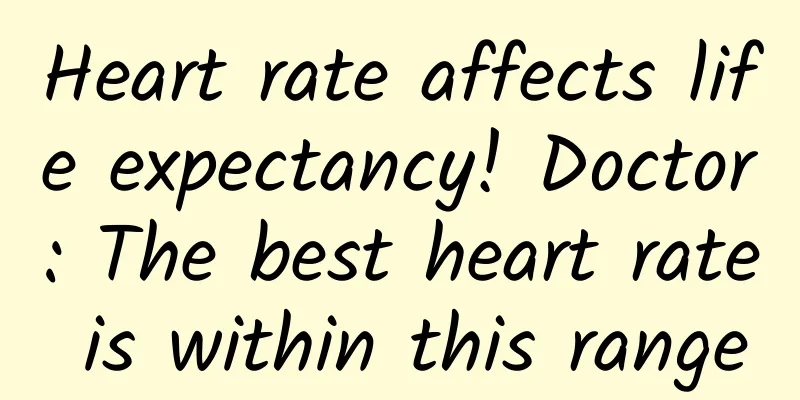Heart rate affects life expectancy! Doctor: The best heart rate is within this range

|
This article was reviewed by Li Jiehui, deputy chief physician, Fuwai Hospital, Chinese Academy of Medical Sciences Some people say that a faster heartbeat is better, while others say that a slower heartbeat is better. Does the speed of the heartbeat really have anything to do with longevity? Is there an optimal heartbeat rate? Heart rate linked to life expectancy "Indeed, many studies have shown that there is an inverse relationship between our heart rate and life expectancy," said Chen Qingyong, attending physician of the Department of Cardiology at West China Hospital of Sichuan University. The number of heartbeats in a person's lifetime is roughly fixed - the total number is maintained at around 3 billion. Other mammals have similar patterns, with the total number of heartbeats maintained at around 1 billion. The total number of heartbeats is fixed, and the faster the heart beats per minute, the shorter the total life span will be. Dr. Chen Qingyong introduced that the normal range of human heart rate is 60 to 100 times, which originates from the sinoatrial node. If it exceeds 100 times, it is called sinus tachycardia, and if it is less than 60 times, it is called sinus bradycardia. If the heart rhythm originates from a non-sinoatrial node, it is called an ectopic rhythm (such as atrial tachycardia, atrial fibrillation, ventricular tachycardia, etc.). Sinus tachycardia is often related to the following 3 factors: 1. Physiological: Drinking tea, coffee, smoking, drinking alcohol, or even emotional excitement, such as having a fluttering heart when you meet someone you like, can cause your heart to beat too fast. This can be regulated through daily living habits. 2. Pathological: tachycardia caused by non-cardiovascular diseases such as anemia, hyperthyroidism, fever, pneumonia, or heart diseases such as myocardial infarction, viral myocarditis, and hypertrophic cardiomyopathy. (Some young people suddenly experience paroxysmal tachycardia, dizziness, black eyes, and even fainting. Some athletes, who seem to be very healthy at ordinary times, suffer from tachycardia during exercise, or even sudden death. This is often considered to be related to pathological tachycardia.) 3. Drug-induced: The use of antidepressants, adrenaline, antihypertensive drugs, etc. can also cause a rapid heart rate Research shows: With every extra heartbeat, Life expectancy reduced by 4 months This statement may sound a bit mysterious at first. Is there any rigorous data to support it? Yes! Professor Wen Qibang of the National Institute of Health in Taiwan once conducted a study. Since 1994, he has collected nearly 2 million health examination data. The study shows that: • The heart rate of the average healthy person is about 60 beats per minute. As the heart rate increases, in the stage of 60 to 70 beats per minute, every increase in heart rate may shorten life expectancy by about 4 months. • In addition, compared with people with a heart rate below 60 beats, the life expectancy of people with a heart rate of 70 to 80 beats may be shortened by an average of 3 years. • For people with a heart rate between 80 and 90 beats, their life expectancy is shortened by an average of 5 years. • For people with a heart rate between 90 and 100 beats, their life expectancy is shortened by an average of 8 years. • For people with a heart rate above 100 beats per minute, the life expectancy will be even shorter, possibly by 13 years. Dr. Chen Qingyong said that tachycardia puts a greater burden on the heart, which may also be one of the reasons for shortening life. Just like machine parts, if they are overloaded every day, the probability of "scrap" is high. This set of data from China may indicate that an increase in heart rate is indeed significantly associated with a shortened life expectancy. There are also related studies abroad. Japan's Ohasama study surveyed more than 1,700 healthy people over the age of 40 and found that after getting up in the morning, the heart rate increased by 5 beats per minute, and the overall cardiovascular mortality rate increased by 17%. If the heart rate is lower than this number, Also be vigilant The normal range of heart rate is 60 to 100 beats per minute, so if it is less than 60 beats per minute, it is considered bradycardia. If it originates from the sinoatrial node, it is called sinus bradycardia. Many people's electrocardiograms during health checkups will indicate sinus bradycardia, such as a heart rate of 50 to 60 beats per minute. Dr. Chen Qingyong explained that this type of bradycardia is often related to genetic and environmental factors and may be normal. If there are no uncomfortable symptoms, you can observe it regularly. However, if the heart rate is too low, it is lower than 50 beats per minute, and ordinary people, except athletes, should be alert. (For athletes, it is normal for the heart rate to be lower than 50 beats per minute, but it is better for the general public not to be lower than 50 beats per minute.) Dr. Chen Qingyong introduced that if the heart rate is lower than 50 times for a long time, we should consider whether it is caused by pathological factors, such as sick sinus syndrome, which is one of the important causes of pacemaker implantation in patients. A significant decrease in heart rate will affect the heart's output and lead to insufficient blood supply to organs throughout the body. How to slow down your heartbeat? In the normal range of 60 to 100 beats per minute, a slower heartbeat means a longer life. So how can we slow down our heartbeats in daily life? 1. Have a good attitude No matter how annoying something is, you need to calm down, take a deep breath, and have a good meal, and the emotion will pass! 2. Avoid “accelerating” foods Coffee, tea, cigarettes, alcohol, sugar, salt, etc. are all foods that "accelerate" the heartbeat. Friends who like these foods but don't tolerate them can give them up appropriately. In fact, the healthiest drink is boiled water. 3. Moderate-intensity exercise is a good way to “slow down” There is a study specifically focusing on the effect of exercise on heart rate, which found that doing moderate-intensity exercise for 40 minutes a day for less than 6 weeks can reduce heart rate from 68 beats per minute to 53 beats per minute. Therefore, exercise is the most important way for ordinary people to lower their heart rate. Moderate-intensity exercise includes jogging, swimming, brisk walking, badminton, etc. But one thing needs to be noted: the above method is only suitable for friends with physiological tachycardia. If it is pathological tachycardia, you need to see a doctor in time. Source: Chengdu Business Daily Sichuan Famous Doctor (ID: scmingyi) This article has been authorized. Please contact the original author for reprinting. The pictures in this article with the "Science Popularization China" watermark are all from the copyright gallery. The pictures are not authorized for reprinting. |
<<: This piece of ancient glass holds the secret of water on Mars!
>>: Why did the chicks I raised in my childhood die so soon?
Recommend
September marketing promotion hot calendar!
Autumn is the season of harvest. In the upcoming ...
How does it feel to watch the big screen at the station on your mobile phone? Experience the new version of 12306
We no longer need to go to the train station to c...
iPhone 6S A9 processor details revealed! Apple is going crazy
There are currently two unsolved mysteries about ...
Counterfeiting is coming! Who will take care of the strongest counterfeiting brand in nature? A plant "counterfeit" the entire forest
Produced by: Science Popularization China Author:...
iPhone 6 and S6 are selling well thanks to Sony
Sony may have lost the smartphone war, but the Ja...
Is the fruit and vegetable washing machine just a waste of money?
A healthy diet requires "vegetables at every...
How to place WeChat public account advertisements to achieve the best results?
We all know that WeChat ads are divided into Mome...
China Passenger Car Association: Analysis of the annual trend of the MPV automobile market in 2021
The full-year sales data for 2021 is out. In Dece...
How can we deliver ads to users who are most likely to spend money?
Every advertiser has this hope: to get the greate...
Not as popular as Lei Jun’s Weibo, many car companies were absent from Chengdu, why are large auto shows no longer popular?
The Chengdu Auto Show opened. As the largest auto...
The new 4C rule: How to ignite a community at low cost?
As the saying goes, "He who controls the com...
3D printing technology can also make electric cars. The key is low cost.
Honda has developed a short-range "Micro Com...
Jupiter-like cloud belt discovered on brown dwarf binary only 6.5 light-years away
[Mobile software: Bo Ke Yuan] Astronomers have di...
Wang Hao's new posture correction-posture assessment and rehabilitation
Wang Hao's new body correction - body assessm...
Brand promotion: How to do Spring Festival marketing?
It’s the Spring Festival again. Brand owners will...


![[Smart Farmers] Can plants predict the weather? Uncovering the ecological secrets behind the "green umbrella"](/upload/images/67f2133101498.webp)






